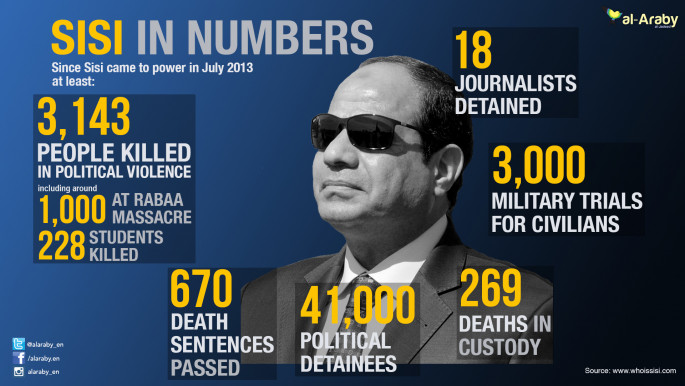Egypt's president praises 2011 revolution, but urges patience
Egypt's president paid tribute to the country's 2011 uprising that toppled longtime ruler Hosni Mubarak, saying that protesters killed during the 18-day revolt had sought to revive "noble principles" and were the founders of a "new Egypt".
President Abdel Fattah al-Sisi's praise for the uprising, delivered via a televised speech on Sunday, the eve of its fifth anniversary, followed a recent spate of arrests and a heightened security presence in the capital, Cairo.
The crackdown on dissent appears to reflect his government's resolve that the day would not be marked by popular demonstrations - or militant attacks.
The remarks come a day after Sisi - a soldier-turned-politician whose 2013 military coup was cemented in a landslide 2014 election victory - praised the country's police and vowed a firm response to "any threat to the country's stability".
His nod to the police ran against growing complaints by rights activists that the force has returned to Mubarak-era practices including torture, random arrests and, more recently, forced disappearances.
Police brutality was among the complaints that drove Egyptians to take part in the 2011 uprising.
Sisi said the 2011 uprising had deviated from its course and had been forcibly hijacked for "personal gains and narrow interests".
That was a thinly veiled reference to the Muslim Brotherhood, whose Mohamed Morsi was elected president a year after the revolution. His tenure of the presidency was to last just a year before Sisi, as military chief, led the coup which ousted him from power in July 2013.
The Brotherhood, the largest and probably most organised Islamist group in the region was subsequently declared a "terrorist organisation" and banned in Egypt. Hundreds of its members have since been jailed, with several of its leaders condemned to death.
The "June 30 revolution" - a reference to the day in 2013 when millions of Egyptians demonstrated on the streets against the rule of Morsi and his Muslim Brotherhood - corrected the course of the 2011 uprising, Sisi said.
That revolution, he said, took place to "restore the free will of Egyptians and continue to realise their legitimate aspirations and deserved ambitions". It has been described as a counter-revolution by many outside the country.
"Egypt today is not the Egypt of yesterday. We are building together a modern, developed and civilian state that upholds the values of democracy and freedom," he said of the two and a half years since the removal of Morsi, Egypt's first elected president.
"Democratic experiences don't mature overnight, but rather through a continuing and accumulative process," he said, before emphasising the need to exercise "responsible freedom" to avoid "destructive chaos".
The rhetorical insistence that "gradual" democratisation was key to stability, mirrored the narrative established by Mubarak during his 29-year authoritarian rule.
 |
Egypt today is not the Egypt of yesterday. We are building together a modern, developed and civilian state that upholds the values of democracy and freedom - Egyptian President Abdel-Fattah al-Sisi |
 |
Sisi has, since 2013, presided over what the human rights group Amnesty International describes as an "unprecedented" crackdown on dissent.
Thousands of Brotherhood supporters, as well as scores of liberal, pro-democracy activists have been detained.
In recent days, security forces have questioned residents and searched more than 5,000 apartments in Cairo's downtown, an area whose cafes, theatres and art galleries have been popular with young, pro-democracy activists.
Administrators of Facebook pages organising protests have also been detained.
Sisi's supporters, including several high-profile TV presenters and talk show hosts, have often justified actions by the police and security agencies as necessary to spare Egypt the chaos and bloodshed roiling regional neighbours Libya, Syria and Iraq.
 |
|



